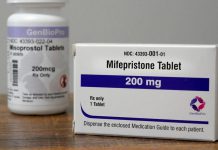If left untreated, depression during pregnancy could affect not only the mother but also the child. Unfortunately, treating depression with antidepressant drugs could affect fetal development.
So, to identify safer antidepressants, a team of researchers led by Dr. Cathy Vaillancourt at the Institut National de la Recherche Scientifique (INRS) is studying the effects of certain drugs.
The researchers targeted the enzyme called aromatase that synthesizes estrogen. During pregnancy, estrogen production is crucial for the development of the fetus as well as the physiological adaptation of the mother.
The findings of the study were published in The Journal of Steroid Biochemistry and Molecular Biology.
In general, antidepressants during pregnancy have been associated with an increased risk of lung and heart malformation in infants. They are also associated with impaired cognition, causing autism in childhood.
However, many experts have noted that not every type of antidepressant has these harmful effects. Not every drug molecule has the same hormonal affinity.
Most antidepressants prescribed during pregnancy target a brain chemical called serotonin. However, studies have suggested that they could also target estrogen. The most common antidepressants include sertraline (Zoloft), citalopram (Celexa), and fluoxetine (Prozac).
Dr. Vaillancourt said, “We wanted to see how the antidepressants that have been developed to block the serotonin transporter also affect aromatase.”
“Using molecular models, we found that all the antidepressants we analyzed seemed to be able to bind directly to the enzyme and regulate its activity. This remains to be confirmed and the precise mechanism needs to be further investigated,” she added.
The researchers studied the effects of different types of depression drugs on the placenta.
“The antidepressants we chose to test are those most commonly prescribed in pregnant women, namely sertraline (Zoloft), venlafaxine (Effexor), fluoxetine (Prozac), paroxetine (Paxil), and citalopram (Celexa),” said study author Dr. Andrée-Anne Hudon Thibeault. “By comparing different doses and molecules, we were able to uncover some of their specificities.”
“Fetal development is strongly linked to the placenta,” said Dr. Vaillancourt. “Every healthy fetus has a healthy placenta.”
“Depending on its form, a molecule may not interact the same way with estrogen and may, therefore, be less harmful to the developing fetus,” added Dr. Vaillancourt.
Dr. Thibeault said, “By testing several types of antidepressants at varying doses, our work will contribute to better choices regarding the type of antidepressant and the dose prescribed for pregnant women while minimizing the side effects on the course of pregnancy and on fetal development.”
Stopping the treatment is not always advisable because depression could lead to serious consequences if not treated well.
Dr. Vaillancourt explained, “Depression is one of the leading risk factors for suicide in pregnant women. Some studies suggest that depression can also compromise fetal development, due in part to poor lifestyle habits.”























